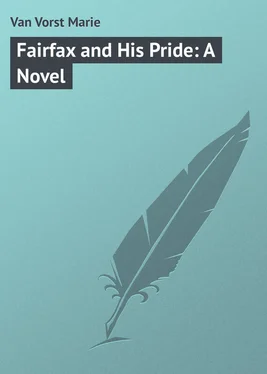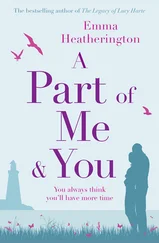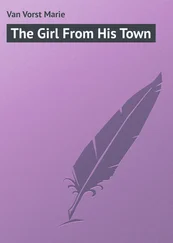Marie Van Vorst - Fairfax and His Pride - A Novel
Здесь есть возможность читать онлайн «Marie Van Vorst - Fairfax and His Pride - A Novel» — ознакомительный отрывок электронной книги совершенно бесплатно, а после прочтения отрывка купить полную версию. В некоторых случаях можно слушать аудио, скачать через торрент в формате fb2 и присутствует краткое содержание. Жанр: foreign_prose, на английском языке. Описание произведения, (предисловие) а так же отзывы посетителей доступны на портале библиотеки ЛибКат.
- Название:Fairfax and His Pride: A Novel
- Автор:
- Жанр:
- Год:неизвестен
- ISBN:нет данных
- Рейтинг книги:3 / 5. Голосов: 1
-
Избранное:Добавить в избранное
- Отзывы:
-
Ваша оценка:
- 60
- 1
- 2
- 3
- 4
- 5
Fairfax and His Pride: A Novel: краткое содержание, описание и аннотация
Предлагаем к чтению аннотацию, описание, краткое содержание или предисловие (зависит от того, что написал сам автор книги «Fairfax and His Pride: A Novel»). Если вы не нашли необходимую информацию о книге — напишите в комментариях, мы постараемся отыскать её.
Fairfax and His Pride: A Novel — читать онлайн ознакомительный отрывок
Ниже представлен текст книги, разбитый по страницам. Система сохранения места последней прочитанной страницы, позволяет с удобством читать онлайн бесплатно книгу «Fairfax and His Pride: A Novel», без необходимости каждый раз заново искать на чём Вы остановились. Поставьте закладку, и сможете в любой момент перейти на страницу, на которой закончили чтение.
Интервал:
Закладка:
"My dear boy, why didn't you let us know you had been ill?"
There is something exquisite to a man in the presence of a woman in his sick-room, be she lovely or homely, old or young.
"This is awfully, awfully good of you, Auntie. I've had a mighty bad time with this foot of mine."
Mrs. Carew in her street dress, ready for an all-day's shopping, came airily in and laid her hand on her nephew's shoulder. Fairfax thought he saw a look of Bella, a look of his mother. He eagerly leaned forward and kissed his visitor.
"It's mighty good of you, Auntie."
"No, my dear boy, it isn't! I really didn't know you were ill. We would have sent you things from the Buckingham. Our own cook is so poor."
She couldn't sit down, she had just run in on her way to shop. She had something to say to him…
"What's wrong, Aunt Caroline?"
His aunt took a seat beside him on the bed. Her dove-like eyes wandered about his room, bare save for the drawings on the walls and on a chair in the corner, a cast covered by a wet cloth. Mrs. Carew's hands clasped over her silk bead purse hanging empty between the rings.
"I have come to ask a great favour of you, Antony."
He repeated, in astonishment, "Of me – why, Auntie, anything that I can do…"
Mrs. Carew's slender figure undulated, the sculptor thought. She made him think of a swan – of a lily. Her pale, ineffectual features had an old-fashioned loveliness. He put his hand over his aunt's. He murmured devotedly —
"You must let me do anything there is to do."
"I am in debt, Tony," she murmured, tremulously. "Your uncle gives me so little money – it's impossible to run the establishment."
He exclaimed hotly, "It's a shame , Aunt Caroline."
"Henry thinks we spend a great deal of money, but I like to dress the children well."
Her nephew recalled Bella's wardrobe. Mrs. Carew, as though she confessed a readily-forgiven fault, whispered —
"I am so fond of bric-à-brac, Antony."
He could not help smiling.
"Down in Maiden Lane last week I bought a beautiful lamp for the front hall. I intended paying for it by instalments; but I've not been able to save enough – the men are waiting at the house. I can't tell your uncle, I really can't . He would turn me out of doors."
Over Fairfax's mind flashed the picture of the "Soul of honour" confronted by a debt to a Jew ironmonger. His aunt's daily pilgrimage began to assume a picturesqueness and complexity that were puzzling.
"Carew's a brute," he said, shortly. "I can't see why you married him."
Mrs. Carew, absorbed in the picture of the men waiting in the front hall and the iron lamp waiting as well, did not reply.
"How much do you need, Auntie?"
"Only fifty dollars, my dear boy. I can give it back next week when Henry pays me my allowance."
He exclaimed: "I am lucky to have it to help you out, Auntie. I've got it right here."
The sense of security transformed Mrs. Carew. She laughed gently, put her hand on her nephew's shoulder again, exclaiming —
"How fortunate ! Tony, how glad I am I thought of you!"
He gave her all of his mother's gift but ten dollars, and as she bestowed it carefully away she murmured —
"It is a superb lamp, and a great bargain. You shall see it lit to-night."
"I'm afraid not to-night, Aunt Caroline. I'm off to see Cedersholm now, and I shan't be up to much, I reckon, when I get back."
His visitor rose, and Fairfax discovered that he did not wish to detain her as he had thought to do before she had mentioned her errand. She seemed to have entirely escaped him. She was as intangible as air, as unreal.
As he opened the door for her, considering her, he said —
"Bella looks very much like my mother, doesn't she, Aunt Caroline?"
Mrs. Carew thought that Bella resembled her father.
As Fairfax took his car to go down to Ninth Street, he said to himself —
"If this is the first sentimental history on which I am to embark, it lacks romance from the start."
CHAPTER XX
At the studio he was informed by Cedersholm's man, Charley, that his master was absent on a long voyage.
"He has left me a letter, Charley, a note?"
"Posted it, no doubt, sir."
Charley asked Mr. Fairfax if he had been ill. Charley was thoroughly sympathetic with the Southerner, but he was as well an excellent servant, notwithstanding that he served a master whom he did not understand.
"I should like to get my traps in the studio, Charley."
"Yes, Mr. Fairfax." But Charley did not ask him in.
"I'll come back again to-morrow… I'll find a note at home."
"Sure to, Mr. Fairfax."
"Benvenuto been around?"
The Italian had sailed home to Italy on the last week's steamer. Fairfax, too troubled and dazed to pursue the matter further, did not comprehend how strange it all was. The doors of the studio were henceforth shut against him, and Charley obeyed the mysterious orders given him. There reigned profound mystery at the foundry. The young man was sensible of a reticence among the men, who lacked Charley's kindliness. Every one waited for Cedersholm's orders.
The Beasts were cast.
"Look out how you treat those moulds," he fiercely ordered the men. "Those colossi belong to me. What's the damage for casting them?"
At the man's response, Fairfax winced and thrust his hands into his empty pockets.
Under his breath he said: "Damn Cedersholm for a cold-blooded brute! My youth and my courage have gone into these weeks here."
As he left the foundry he repeated his injunction about the care of the moulds, and his personal tenderness for the bronze creatures was so keen that he did not appreciate the significant fact that he was treated with scant respect. He stepped in at the Field palace on the way up-town, and a man in an official cap at the door asked him for his card of admission.
"Card of admission? Why, I'm one of the decorators here… I reckon you're new, my boy. I only quit working a fortnight ago."
He was nervous and pale; his clothes were shabby.
"Sorry," returned the man, "my orders are strict from Mr. Cedersholm himself. Nobody comes in without his card."
The sculptor ground his heel on the cruel stones.
He had been shut away by his concentrated work in Cedersholm's studio from outside interests. He had no friends in New York but the children. No friend but his aunt, who had borrowed of him nearly all he possessed, no sympathizers but the little old ladies, no consolations but his visions. In the May evenings, now warm, he sat on a bench in Central Park, listlessly watching the wind in the young trees and the voices of happy children on their way to the lake with their boats. He began to have a proper conception of his own single-handed struggle. He began to know what it is, without protection or home or any capital, to grapple with life first-hand.
"Why, art is the longest way in the world ," he thought. "It's the rudest and steepest, and to climb it successfully needs colossal genius , as well as the other things, and it needs money."
He went slowly back to his lodging and his hall room. Along the wall his array of boots, all in bad condition – his unequal boots and his deformity struck him and his failure. A mist rose before his eyes. Over by the mirror he had pinned the sketch he liked the best.
On Sunday afternoon, in his desire to see the children, he forgot his distaste of meeting the master of the house, and rang the bell at an hour when Carew was likely to be at home. He had, too, for the first time, a wish to see the man who had made a success of his own life. Whatever his home and family were — Carew was a success. Fairfax often noted his uncle's name mentioned at directors' meetings and functions where his presence indicated that the banker was an authority on finance. Ever since Mrs. Carew had borrowed money of him, Fairfax had been inclined to think better of his uncle. As the door opened before him now he heard singing, and though the music was a hymn, it rolled out so roundly, so fully, so whole-heartedly, that he knew his uncle must be out.
Читать дальшеИнтервал:
Закладка:
Похожие книги на «Fairfax and His Pride: A Novel»
Представляем Вашему вниманию похожие книги на «Fairfax and His Pride: A Novel» списком для выбора. Мы отобрали схожую по названию и смыслу литературу в надежде предоставить читателям больше вариантов отыскать новые, интересные, ещё непрочитанные произведения.
Обсуждение, отзывы о книге «Fairfax and His Pride: A Novel» и просто собственные мнения читателей. Оставьте ваши комментарии, напишите, что Вы думаете о произведении, его смысле или главных героях. Укажите что конкретно понравилось, а что нет, и почему Вы так считаете.











